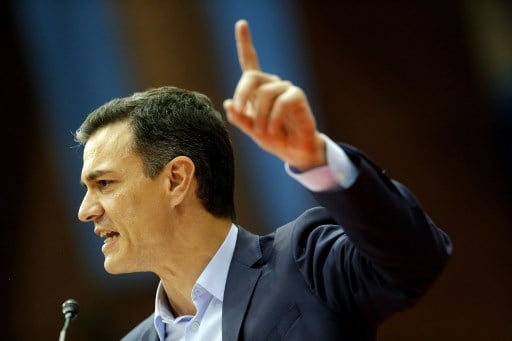Given up for politically dead after losing the last two general elections, the 47-year-old became prime minister in June after winning a surprise no-confidence vote against his graft-tainted conservative Popular Party (PP) predecessor Mariano Rajoy.
READ MORE:
- Five important things to know about the Spanish election
- EXPLAINED: Everything you need to know about Spain's general election
- All the words you need to know to understand Spain's general election

But with just 84 seats in the 350-seat parliament — the smallest majority in modern Spanish history — the trained economist governed for months by seeking agreements with far-left party Podemos and Catalan separatists who had backed the no-confidence vote that brought him to power.
But this fragile alliance finally cracked in February when the Catalan separatist parties joined forces with the PP and centre-right Ciudadanos to reject his draft 2019 budget, forcing Sanchez to call the snap polls —
Spain's third general election in less than four years.
This time around Sanchez wants to capitalise on his experience as prime minister — which none of his rivals has — to present himself as the best guarantee of political stability.
“He adopts a position of prime minister and of being prime ministerial, projecting the image of one who governs and must have a posture of moderation, solidity and seriousness” during a very aggressive election campaign, said political scientist Cristina Monge of the University of Zaragoza.
Sanchez also benefits from being “well positioned on the left” which allows him to take advantage of Podemos' internal division and from his government's record of adopting popular social measures such a 22 percent hike in the minimum wage, she added.
Rise in polls
The PP, Ciudadanos and upstart far-right party Vox accuse Sanchez of being a “traitor” because of his willingness to engage with Catalan separatist parties.
He counter-attacks by warning of the risk that the PP and Ciudadanos could form a government with the support of Vox, a fierce opponent of feminism and illegal immigration.
“It is very important to concentrate all possible votes in the party that can defeat the two conservative parties and the far-right and that is the Socialist party,” he said Tuesday during a televised debate.
The strategy seems to be paying off. Support for the Socialists has inched up since Sanchez in February called the election and the party is far ahead of its rivals although polls suggest it will fall short of an absolute majority in parliament.
Sanchez could either repeat his alliance with the far-left and minority parties, including most likely the Catalans separatists — or he could try a pact with Ciudadanos even though the centre-right party's leader has
repeatedly ruled this option out.
Surprise comeback
Born on a February 29th — a Leap Day — in 1972 in Madrid, Sanchez grew up in a well-off family, his father an entrepreneur and his mother a civil servant.
A married father of two daughters, he studied economics in the Spanish capital and the Free University of Brussels before obtaining a doctorate degree from a private Spanish university. Last year he angrily denied
accusations that parts of his thesis were plagiarised.
The 1.90-metre-tall (6-foot-2) former basketball player joined the Socialist party in his early 20s. He served as a municipal councillor in Madrid between 2004 and 2009, then as a national lawmaker.
Despite being largely unknown, Sanchez in 2014 won a primary election to become Socialist party chief, beating more experienced politicians.
Several party heavyweights never warmed to him and after leading the Socialists to two consecutive general election defeats in 2015 and 2016, Sanchez was pushed out in an internal rebellion.
But in May 2017 he got his revenge by unexpectedly winning back his old job in a party primary election after driving from rally to rally in his own car, easily defeating his main rival Susana Diaz, who was then head of the regional government of Andalusia, a Socialist stronghold.
By AFP's Álvaro Villalobos




 Please whitelist us to continue reading.
Please whitelist us to continue reading.
Member comments